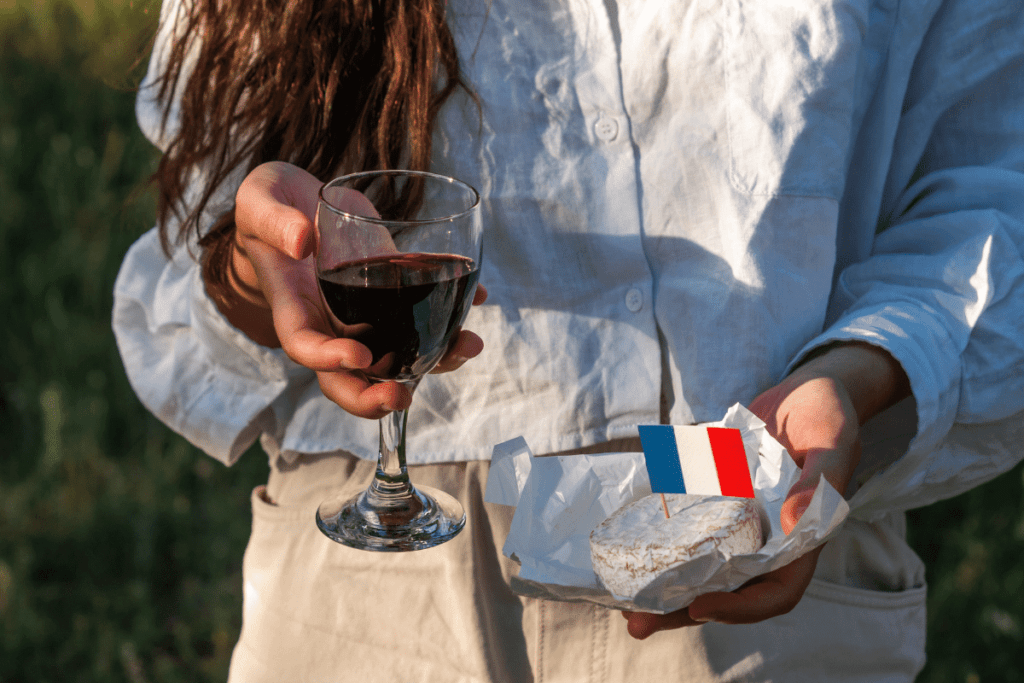
Why is French wine so good? That’s the question that keeps us up at night. It’s not really up for debate, is it? There’s something about the wine of France that makes it stand out. French wine is widely regarded as the best wine in the world. But as to why it’s so good… Je ne sais pas. Just kidding. We did our research. The reason that French wine hits different is due to a combination of terroir (we’ll explain), land, cuisine, and culture. Keep reading to uncover a few French wine secrets (we promise you’ll either pour yourself a glass by the end of this or run to your nearest wine shop).
Brief History of French Wine
Believe it or not: the French were not the first to make wine. “Sacré bleu!” In truth, the Eurasian grape (the mama grape of 99 percent of all wines) was first domesticated 9,000 years ago in China.
It wasn’t until 425 BC, after wine was imported to the Mediterranean, that wine found its way to France. But once the French started making their own wine, there was no turning back. French wine became the world standard for wine in the Middle Ages and is still considered to be today. The question is, why?
Why Is French Wine So Good?
Terroir
Simply put, French wine is special because it has soul. It gets its soul from terroir—the practice of creating wine that is deeply influenced by the particular character of the soil, climate, sun, and minerals of the specific area it is grown from. That’s why French wine is named after the region, not the grapes that it uses. If you drink a Chablis, you might not see the grape variety (Chardonnay) prominently displayed on the label.
In contrast, an American wine would make the Chardonnay grape variety prominent, and make it lesser-known exactly where the grapes were grown and the wine was made.
But “Terroir” is More Than That: It's a Philosophy
“Terroir” is a bit of a philosophy. It’s a tradition in winemaking that rejects the industrial techniques of the modern-day that makes wine more reliable and uniform. “Terroir” keeps French wine exciting, uncertain, and variable—just like life!
To understand what the (heck) this means, a journalist from Bon Appetit traveled to France to observe the traditions of famous French winemakers herself. She found one winery employed three donkeys to do the fieldwork, all the while munching on grapes and fertilizing every few steps. Another winery relied on the whims of the rain to water their grapes. And one winemaker, Simon Busser, decided when to pick his grapes based on how they tasted. Most American winemakers would surely follow a schedule for planting and picking grapes… but not the French!
Of course, not all French wineries follow these traditions—but the majority balance a sense of trust that the land and weather will work together to create a truly unique and special taste. By embracing the uncertainty and chaos that is nature, there is a risk (lots of it), but also countless possibilities and chances to make a truly remarkable and memorable wine.
Land
Perhaps the reason that “terroir” emerged as an integral part of French winemaking was due to France’s land. France has both high-latitude zones with a cooler climate and mid-latitude zones with a warmer climate. This makes really good wine. (For context, Italy and Spain only have mid-latitude zones and Germany only has a high-latitude zone.)
France also has dry and cool winds, chalk and limestone deposits, and alkaline soils, which make the wine more delightful.
And then, of course, there are France’s famous oak forests. Napoleon originally planted these trees so that warships could be made out of them 400 years later. Instead, these incredible oak trees are used to make barrels to store wine. The oak barrels are exceptionally talented at storing French wine and keeping the taste, color, and depth intact.
Cuisine
Did you know that wine was traditionally always consumed with food in France? The image of a melancholy character pouring themselves a glass of wine at the end of a hard day didn’t really happen before the modern-day.
Beyond being a social tradition, French wine is made to taste divine with French cuisine. Due to the cooler climate of its high-latitude zones (think: Bordeaux, the Loire Valley, Burgundy, and Champagne) the wine made in these regions are lower in alcohol, higher in acidity, and lighter bodied. These characteristics make the wine taste better with food, compared to the high-alcohol, fuller-bodied American wines.
Culture
Because French wine is intricately linked with its culture, French people are raised with it. Put simply, it means French people have refined palates. Most French people care beaucoup about how things taste. They pay attention to the subtleties, the aroma. They have a higher standard, let’s be real. Can’t fool a Frenchie with a cheap wine!
France Is Calling!
While writing this, we couldn’t help but pour a glass of Côtes du Rhône. After reading this, we think you’ll likely want to do the same. If you want to take your appreciation of French wine to the next level, you’ll need to go to France. On The Travel Yogi France Yoga Adventure, you’ll spend your time wandering through medieval villages, soaking up French culture as the locals do. You’ll enjoy fresh pastries in French marketplaces, sommelier wine tastings, and every kind of french dish you’ve ever dreamed of. You don’t want to miss it. Learn more here.

